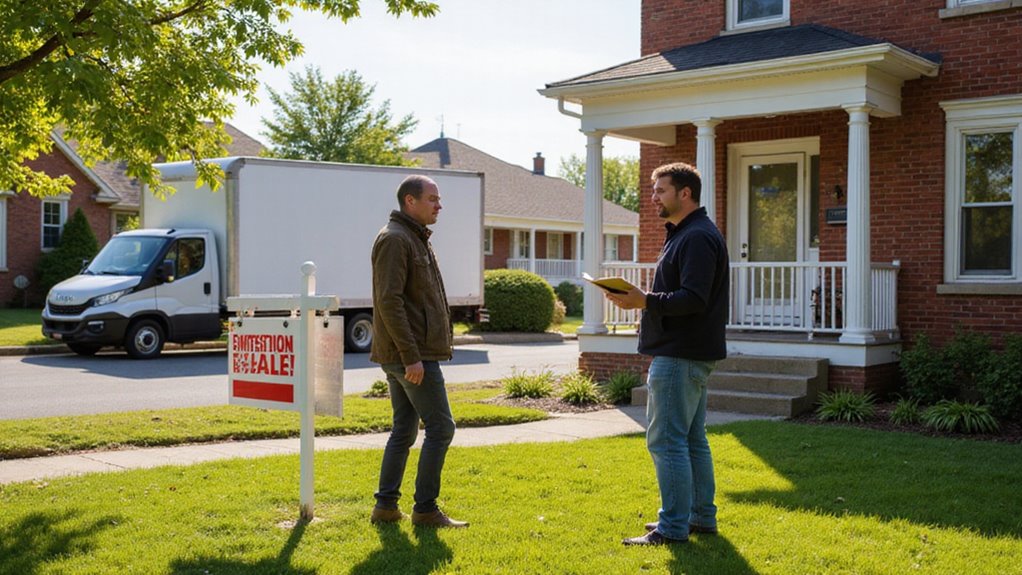Selling a House to Settle a Debt in Cincinnati




If you are facing mounting debt in Cincinnati, selling your house can seem like the only way out. Debts can add up quickly and make it hard to keep up with mortgage payments. The fear of foreclosure can weigh heavily on your mind.
You may feel overwhelmed by the pressure to act quickly as bills pile up. The Cincinnati real estate market can change fast, making it hard to know when to sell. Without a plan, you risk getting less money or facing more stress.
Selling your house to settle a debt in Cincinnati is possible if you understand your options and act wisely. There are steps you can take to maximize your home’s value and avoid common mistakes.
A clear approach can protect your finances and peace of mind. This blog will guide you through selling your house to settle debt in Cincinnati and help you make smart decisions.
Table of Contents
Understanding Debt Settlement Through Home Sale

Selling your house in Cincinnati can help you pay off large debts. If you owe less on your mortgage than your home’s value, selling may give you enough money. This option works best if your house is in a good location.
A credit counseling agency can explain how selling will affect your debts and credit. They help you understand your choices and talk to your creditors. You should contact them before making any decisions.
If you have enough equity, selling your home can solve your debt problems. This step may help you avoid bigger financial issues later. Making an informed choice puts you in control.
Strategic Approaches to Selling Your House for Debt Settlement
When you’re selling your house in Cincinnati to settle debts, you need to first identify which obligations are prompting the sale—whether it’s medical bills, credit cards, or foreclosure risks. Carefully assess your total debt load and determine how much your home’s market value can realistically cover in today’s local market. It’s also essential to understand the legal requirements specific to Ohio for using sale proceeds toward debt settlement to avoid unexpected complications.
Certain types of debt often make Cincinnati homeowners sell their houses. If you have high credit card balances, rising medical bills, or missed mortgage payments, you may need to consider selling. Legal judgments or costly home renovations with poor returns can also cause financial trouble.
Homeowners facing these debts may feel stress, fear, or anxiety. Overdue mortgages can bring fear of foreclosure. Medical bills create uncertainty, and failed renovations often lead to regret. If you know what kind of debt you have, you can decide your next steps. This information helps you make better choices in the Cincinnati property market.
Evaluating Your Total Debt Situation
How Much of Your Debt Can Home Sale Cover?
Legal Requirements for Debt Settlement
Before selling your Cincinnati home to pay debts, first review your complete financial situation. List all your debts, such as credit cards, loans, and medical bills. This gives you a clear picture of what you owe.
You should also find out your home’s value. Schedule a home appraisal and inspection to get an accurate estimate. If you know your home’s worth, you can make better choices when selling.
Cincinnati neighborhoods have different property values. An accurate appraisal helps avoid surprises later. Evaluating your debts and assets prepares you for the selling process.
Selling your house in Cincinnati can pay off some or all of your debt. The exact amount depends on how much your home sells for. It also depends on your mortgage balance and selling costs.
You need to know your home’s current market value. Any money still owed on your mortgage or other liens must be subtracted. Agent commissions and closing fees will also reduce what you get.
If you want to increase your home’s value, consider small renovations. Make sure the cost of improvements does not outweigh the benefit. Recent home sales in your area can help you set a realistic price.
Add up your expected sale price and subtract all costs. The leftover amount is what you can use to pay your debts. If this covers your debts, a home sale is a good option.
If you want to settle a debt by selling your house in Cincinnati, you must follow Ohio’s legal rules. Review your mortgage and check for any liens because these must be paid before the sale finishes. Always get a proper property valuation to avoid selling for less than it is worth.
If the home is part of an estate, you may need legal documents and court approval. Estate planning laws could apply in this case. The process may take longer if you need probate court involvement.
Cincinnati requires certain disclosure forms and compliance with local property regulations. Failing to complete these steps can delay or stop the sale. Always check local rules before listing your home.
If you work with a cash buyer like Prestige Investments Cincinnati, they can help with paperwork and legal steps. They make sure you meet all necessary requirements. This can help your sale go faster and smoother.
How to Work with Creditors During the Sale Process
As you move forward with selling your Cincinnati home to settle debts, you’ll need to coordinate closely with each creditor—especially if multiple parties are involved. It’s essential to secure creditor approval for the sale, gather the right documentation, and negotiate clear payment arrangements to avoid delays at closing. Understanding these local requirements helps you protect your interests and streamline the payoff process.
When selling your house in Cincinnati to pay debts, you may need to work with several creditors. Each creditor may have different requirements. Clear and simple communication is important throughout the process. Property valuation and local market trends are key details to gather. This information helps you explain your sale price to creditors. If creditors see proof, they may agree to your price.
You should find out which debts need urgent attention and which creditors are more open to negotiation. If you provide recent market data, creditors may better understand your situation. Direct talks can help you ask for lower payoff amounts or easier settlement terms. A careful and organized approach can help you keep more money from the sale. If you meet creditor requests, you may resolve debts faster.
Getting Creditor Approval for Sale
Documentation Requirements
Setting Up Payment Arrangements
You must get your creditor’s approval before selling your home. Creditors want to be sure the sale will cover your debt. Without approval, the sale may face delays or not happen at all.
Creditors will review your home appraisal and sale strategy. A clear appraisal shows them your price is fair for the Cincinnati market. If you present strong data, creditors may be more willing to approve.
You should also explain your plan to attract buyers. This might mean focusing on cash buyers or using local market trends. Open communication with your creditor can help you get the approval you need.
To ensure your Cincinnati home sale goes smoothly when settling a debt, gather the correct documents for your creditors. Proper paperwork is essential for a successful sale. Missing documents can delay the process or reduce your sale proceeds.
Creditors may ask for proof of home ownership, like your deed or title. You should also have a recent property valuation, such as an appraisal or market analysis. If you have these, you can show the home’s current value.
Debt statements are also required for each creditor you owe. These should show recent balances and account details. Organized documents help answer questions and keep the sale progressing.
To set up payment arrangements, contact each creditor after collecting your documents. Explain that the sale proceeds will pay your debts. Share a clear estimate of your home’s sale price based on recent neighborhood sales.
If the Cincinnati market changes, use updated data to help your negotiations. Tell creditors your planned sale timeline. Ask about their preferred payment methods, since some may want direct escrow payments.
If you have a cash buyer like Prestige Investments Cincinnati, mention the fast closing. Explain that no repairs or staging are needed. This can make creditors more confident in a quick, smooth process.
Always put payment agreements in writing. Confirm how any extra money will be given to you after debts are paid. Keep all records for your files.
Financial Planning for Debt Settlement
You’ll need to start by accurately calculating your home’s equity, since Cincinnati’s property values can directly impact your available funds for debt settlement. Make sure you understand any potential tax consequences from the sale, and prioritize your debts based on urgency and interest rates. If there’s a remaining balance after closing, have a clear strategy to manage what’s left so your financial future stays secure.
Calculating Your Home’s Equity Position
Your home’s equity is the value you own after paying off your mortgage. To find this, first get a home appraisal for the current market value. Then, subtract your remaining mortgage balance from this value.
If you want an accurate appraisal, hire a Cincinnati real estate professional. The appraised value can change with local market trends. Recent neighborhood sales can also affect your home’s value.
Ask your lender for your latest mortgage payoff amount. If you subtract this payoff from your home’s appraised value, you get your equity amount. This number helps you decide how to settle your debt.
Understanding Tax Implications
Selling your Cincinnati home to pay off debt can create tax issues. The IRS may tax any profit made from the sale. You should check if your profit is considered a capital gain.
If your home value increased because of renovations or neighborhood trends, your profit could be higher. Cincinnati areas with fast-rising prices may cause your sale to exceed tax-free limits. If this happens, you might owe capital gains tax.
Homeowners who have lived in the house for at least two of the last five years may get a tax break. The IRS allows up to $250,000 profit exemption for singles and $500,000 for couples. You must meet the 2-of-5-year rule to qualify.
Keeping records of renovation costs can help lower your taxable gain. If you settle debt with your sale, a tax advisor can explain your exact situation. Market trends in Cincinnati can affect your home’s value, so check current prices before listing.
Creating a Debt Payment Priority List
Selling your Cincinnati home can give you money to pay off debts. You need a clear plan for how to use these funds. A smart payment order will help keep your finances stable.
Start by listing all your debts, such as your mortgage, credit cards, and taxes. If you check each debt’s urgency, you can see which ones need fast payment. Some debts may have serious consequences if ignored.
Rank your debts by their interest rates and possible risks. High-interest or secured debts should come first. Missing payments could lead to bigger problems or loss of property.
Use the money from your home sale to pay off the most important debts first. If you have extra funds, pay down the next priority debts. This method helps you protect your credit and avoid future stress.
Managing Remaining Debt After Sale
When you sell your Cincinnati home, you may still have some debt left. You should make a clear plan to pay off what remains. Check your updated debt list after using your home sale money on the most important debts.
If you have different debts, look for the ones with the highest interest rates. Paying these off first can save you money in the long run. Lower-balance debts can also be managed by combining them or asking for better payment terms.
A local financial advisor can help if you are unsure what to do next. They may know options specific to Cincinnati. If you act quickly and plan well, you can avoid more debt problems in the future.
Legal Considerations and Protection
You’ll need to understand Cincinnati’s specific laws on debt settlement before listing your home, especially when weighing the benefits of selling versus filing for bankruptcy. Protecting your rights during every stage of the sale is crucial, so don’t overlook the value of working with a experienced debt settlement attorney familiar with local regulations. With the right legal guidance, you can confidently navigate paperwork, creditor negotiations, and closing requirements unique to the Cincinnati market.
Cincinnati Laws on Debt Settlement
Cincinnati laws affect how you sell your house if you need to pay off a debt. Ohio law has clear steps you must follow. These rules cover liens, creditor notifications, and taxes.
You must pay any outstanding real estate taxes at closing. Any liens, like those from unpaid contractors, must be settled first. If you do not resolve these, the sale cannot go through.
Ohio consumer protection laws also guard your rights as a homeowner. If a creditor tries to take more than what is owed, the law limits them. Knowing these rules helps you make safe and smart choices.
Bankruptcy vs. Home Sale
When facing debt, you may need to choose between bankruptcy or selling your Cincinnati home. Bankruptcy can stop creditors, but it can also harm your credit and cause asset loss. Selling your home may give you quick cash and help protect your credit.
If your local real estate market is strong, selling your home might be a better option. Some Cincinnati neighborhoods have higher demand, which can mean faster sales and better prices. You should check your home’s value and compare it to what you owe.
Consider your home equity, the local market, and your debts before deciding. If you are unsure, talk to a financial advisor or real estate expert. This can help you make the best choice for your situation.
Protecting Your Rights During Settlement
When settling a debt by selling your house, you have important legal rights. These rights help protect your interests throughout the sale in Cincinnati. Understanding and using them is key to a fair process.
Ohio and Cincinnati have specific laws for home sales. You should research how staging your home can boost buyer interest. A neighborhood appraisal ensures your home’s price matches its true market value.
Carefully review the sale contract for hidden fees or unfair terms. Make sure all property disclosures meet Cincinnati’s legal requirements. Always check that the buyer, especially if paying cash, is legitimate.
If you follow these steps, you will stay protected during the settlement. This preparation can help you achieve a successful sale.
Working with Debt Settlement Attorneys
Working with a debt settlement attorney helps protect your interests when selling your house in Cincinnati to pay off debts. An attorney understands Ohio property laws and can talk directly to creditors. This support helps you avoid missing important details.
The attorney will review purchase agreements to make sure the terms are fair. If you are working with cash buyers like Prestige Investments Cincinnati, they will protect your interests. Legal advice on home staging or appraisals can help you get a better sale price.
A debt settlement attorney checks for liens and other legal issues before you close. This step ensures you do not lose more money than needed. If you want peace of mind during the sale, hiring an attorney is a strong first step.
Submit Your Information Below For A Cash Offer On Your Property
Timeline Management
You need a clear timeline to sell your Cincinnati home efficiently, especially when debt repayment is on the line. Set realistic sale deadlines, coordinate with creditors, and manage multiple payment schedules to avoid unnecessary delays. Understand the local closing process so you can foresee each critical step and keep your sale—and debt resolution—on track.
Setting Realistic Sale Deadlines
Setting a realistic sale deadline helps you settle your debt on time. You should check your home’s value based on recent local sales. Setting your deadline according to market trends in Cincinnati prevents delays and stress.
Research how long similar homes stay on the market in your area. If your home needs repairs, allow extra time before listing it. Selling as-is may speed up the process but can affect your sale price.
Consider cash buyers like Prestige Investments Cincinnati if you need a quicker sale. Cash buyers often close deals faster than traditional buyers. If you stay informed, you can adjust your timeline and make better decisions.
Coordinating with Creditors
Coordinating with creditors means matching your home sale schedule with their needs. You should let creditors know about your selling plans and key dates. This helps everyone understand when payments may happen.
Home renovations or changes in your neighborhood’s value can affect your sale. If you plan improvements, tell creditors how this could change the timing or amount owed. Updated appraisals may also affect what you can pay them.
Sharing new information with creditors builds trust. If you face delays, you may ask for extra time or short-term relief. Clear updates reduce surprises and help negotiations go smoothly.
Managing Multiple Payment Schedules
Managing multiple payment schedules means keeping track of different payments during a house sale in Cincinnati. You must pay creditors, service providers, and the mortgage lender on time. If you miss deadlines, you may face extra fees or penalties.
Property values in Cincinnati can change quickly. If the market shifts, you should update your payment plans. Accurate figures help you settle debts properly.
You should monitor deadlines for all payments. If market trends change, adjust your timeline. Staying organized protects your interests and helps you avoid problems.
Closing Process Timeline
The closing process timeline shows how soon you can pay off your debt after selling your Cincinnati home. In Cincinnati, closing usually takes 7 to 21 days after finding a buyer. Cash buyers can sometimes make this even faster.
The process includes title searches, inspections, and legal paperwork. Sellers must pay any remaining property taxes and clear all liens before closing. If you stay organized, you can avoid delays.
A fast closing reduces extra costs and stress. Cincinnati’s market moves quickly, so a smooth process helps you resolve debt sooner. If you keep track of each step, you can move forward confidently.
Markets We Buy Houses In
Need a Fast, Reliable Solution? Prestige Investments Cincinnati Can Help

If you need to sell your Cincinnati home fast, Prestige Investments Cincinnati can help. We offer a quick and reliable way to settle your debt. Our team focuses on making the process simple for local homeowners.
You can get a cash offer right away based on current market conditions. There is no need to do repairs or stage your home. We buy houses in any condition.
All paperwork and legal steps are handled for you. This ensures the sale is smooth and follows all rules. If you want to avoid delays, our process is a good choice.
We take care of all paperwork and legal steps, ensuring a smooth, rule-abiding sale without unnecessary delays. Selling your house with us means less stress and no hidden costs. If you need a fast and fair sale, consider our services.
Selling a House to Settle a Debt in Cincinnati: Frequently Asked Questions
Is it worth selling my house to get out of debt?
Selling your house to pay debt is extreme. It may hurt your credit and cost a lot in fees, taxes, and moving. Debt settlement affects only unsecured debt like credit cards—not your mortgage. Consider safer options before risking your home and financial stability.
Can I use my house to get out of debt?
Yes and no. You cannot settle mortgage or home loans through debt settlement—they are secured debt. But you could borrow against home equity to pay other debts. That adds risk and costs. It’s better to seek lower-risk options before using your house as collateral.
How much does it cost to settle a debt?
Debt settlement companies usually charge 15% to 25% of the total enrolled debt (some up to 30%). In Ohio, fees are similar. Many programs also require setup or escrow account fees. If you settle $5,000, expect fees of $750–$1,250.
Is debt settlement really worth it?
Debt settlement might help reduce what you owe by 30–50%. But it can damage your credit for up to seven years and trigger tax bills on forgiven amounts. It’s risky and usually a last-resort option.
What percentage of my debt should I offer to settle?
Start offers around 25–30% of the total debt. Creditors often counter higher amounts. Most successful settlements reduce debts by 30–50%. You may need to negotiate to find a middle ground that creditors accept.
What is the success rate of debt settlement?
Debt relief companies successfully settle about 55% of accounts. Within 36 months, ~74% settle at least one account, ~59% settle half their debts, but only ~23% settle all accounts. Success varies by situation.

